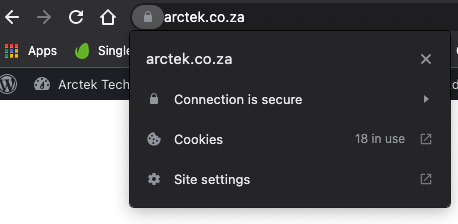We often get asked questions or issues that relate to hosting when consulting, and often it may be a hosting related issue. Here are 5 things you should know about hosting a WordPress website, or any website for that matter.
1. SSL Certificates
A SSL certificate encrypts data (and verifies) between the visitor’s browser and your server. These certificates are usually renewed on a yearly basis, but sometimes more frequent. Almost all shared or managed host plans provide a free SSL certificate as part of the monthly plan and is more than enough for the average site.

In today’s times, I feel that you don’t need to pay yearly for a SSL certificate in most average website cases. Services like Let’s Encrypt or cPanel provide certificates for free.
If you have any questions or issues relating to your SSL certificate you should reach out to your hosting support to investigate and assist you in rectifying this issue.
2. Shared Hosting vs Managed Hosting vs VPS
Hosting a WordPress website can be broken up into three options: Shared Hosting, Managing Hosting and VPS.
Shared Hosting
Think of this option as owning a piece or section of a larger server. This means that resources and load is distributed accordingly or assigned to what you are paying for and is often the cheapest hosting solution you can find.
This means that a server may be broken up into 10s-100s of pieces that are rented out to cover the cost, maintenance and support of the server itself.
I’ve had success on certain shared hosting platforms and it’s not all bad.
Managed WordPress Hosting
Managed WordPress Hosting (or another niche managed host) is similar to shared hosting where resources may be shared but think of this as being pre-tuned to fit WordPress or other CMS needs.
Managed solutions often include improved security, configured WordPress settings and performance boosts. These solutions are ideal for businesses or websites that get quite a bit of traffic to their site and want optimal performance through a shared hosting solution.
This type of hosting is often more expensive than shared hosting options.
VPS
This is not for the faint of heart. A Virtual Private Server (VPS) will require a decent amount of knowledge with server tools like SSH, SFTP and often Linux.
A VPS will share server resources but have dedicated resources assigned to your virtual server, similar to shared hosting but often you will have full access to the server and be able to install any application, run a web server, file server or other applications of your choice. For the sake of this article, we’ll not be diving deep into the nitty gritty of what a VPS is and what you can do with one.
We’ve recently moved over our WordPress plugin site to a VPS solution and we’ve seen improved speed in website load times! (Almost 90 rating on Google Page Speed desktop, running on WordPress and a few other tweaks).
This is sometimes around the same price as managed hosting options or premium shared hosting options – however the pro here is you can scale easier and run multiple applications off one server.
3. Hosting Support
Depending on the type of hosting solution you opt-in for will determine the support you get. The general rule of thumb regarding hosting support is that they will assist you with anything hosting related and not WordPress or site/coding issues that arise.
In some cases, like Managed WordPress hosting you may get certain questions answered by their support team relating to a WordPress specific issue.
Understanding what support covers, and the right person to ask (the hosting team or your developer) will help get you back up and running quicker. We often get requests about issues that are pertaining to a host or server side issue which we cannot resolve from our end.
4. Installation, Control Panel and Backups
Something important to consider when planning to host a WordPress website is how can you interact with your server, how backups are handled and how to install and setup your new site.
The most common website control panel is cPanel – this makes creating emails, installing WordPress, changing your PHP version or adjusting spam settings a breeze in comparison to other solutions.
As mentioned prior, a VPS solution gives you the barebones of a server and you would need to install and configure cPanel or another control panel if you wanted or run commands to install website content and so on.
Backups
Backups are one of the most important parts of running a website. I would rather have a backup and not need it than need a backup and not have it.
I’ve been caught out in the past, when I was just running my consulting web business where server’s and their backups have failed – just bad luck I guess 🤷♂️ but these things do happen.
Cheaper hosts, to keep costs down, may backup your site once a month or not even at all. This is okay if you are handling your own backups or your site doesn’t change on a monthly basis. I highly recommend backing up your site regularly and automatically to a cloud service of some sort just in case your server goes down or data gets corrupted.
Be sure to overlook your hosting package backup policy to see if it suits your needs.
For interest sake, here is another article relating to important WordPress maintenance tasks that you should be doing on a regular basis to ensure your site is looked after:
5. A Note About Cost
There are cheap hosts out there, but I can almost definitely say you’ll run into problems as your site grows or even have some sort of flaw. When your livelihood is dependent on your website don’t skimp on your hosting plan.
I’ve personally seen in the past, when there were bumps in traffic around holidays or those busy periods. Sites would crash because it couldn’t handle the load or load times were ridiculously slow.
This is a double-edged sword as top tier hosting or the most expensive hosting may not fit your needs as well but often the cheaper side of things causes more problems – especially if you’re starting out.
Having a reliable web server may also help you rank better, and reduce page load times.
Bonus: Recommended Hosts and Services
We thought to throw in a couple of recommendations that we’ve personally use or used in the past that worked for us.
Currently, across our sites we use the following services:
- HostAfrica – We’ve currently on a reseller account for a shared hosting plan which we utilize for a handful of our own websites for the past couple of years. Their support team has been great and quick to respond to any server questions.
- Mshini – This is great if you’re looking for a specific WordPress managed hosting platform that handles your WordPress site only (no email hosting). This website is hosted through Mshini and we’ve noticed quite a decent bump in performance.
- Digital Ocean – Our overseas servers are hosted through Digital Ocean, if you’re familiar with VPS and servers this company needs no introduction. The performance and uptime has been great, we’ve reduced our costs to a fraction of what we were previously paying. Signup here and get $100 in credit!
- ServerPilot – This is used to tie in with our VPS plans, ServerPilot makes it easier to handle the server side tasks such as installation of sites, security and much more. Signup here to get $10 in credit!
Photo by Silvestri Matteo on Unsplash


